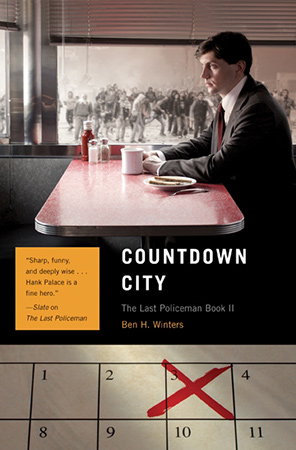 Countdown City
Countdown City
By Ben H. Winters
Quirk Books
2013
The world is still going to end. That’s the reality facing former Concord, NH, police detective Hank Palace as Countdown City, the second book in Ben Winters’ Last Policemen trilogy, opens.
Still going to end because Maia, a 6.5-km-wide asteroid discovered by scientists prior to the events of the first novel, will collide with Earth in 77 days, an event that will kill millions and, eventually, snuff out much of the rest of life on the planet. Maia and the doom it brings are constant, but the pace of change accelerates as the day of impact approaches.
Hank Palace isn’t much for change. He prefers consistency, routine. Rather than killing himself in despair or spending his remaining days in hedonistic indulgence, as many people have done since it became clear that Maia would hit Earth, he stayed at his job as a policeman (earning a promotion to detective after the ranks thinned due to attrition). While his fellow officers and detectives are content to amble through whatever cases crop up, not exerting themselves and wanting simply to ease into their ends, Palace can’t stop himself. In The Last Policeman (which won the 2013 Edgar Award for Best Paperback Original), that means that he can’t accept a suicide as what it seems to be and unravels a murder that would otherwise have gone unsolved.
In that book, Palace was able to largely ignore the changes exploding around him by putting his head down and working. In Countdown City, with Maia—and thus the end—ever nearer, the changes are unavoidable. The government has imposed harsh, militarized laws, communications networks are falling offline from neglect, boats full of refugees are arriving in the already-strained and stressed United States. Closer to home, Palace can no longer call himself detective: he’s been laid off and what remains of the Concord PD is devoted to enforcing the new laws, not solving crimes (what would be the point, anyway, since the world will end long before most sentences?).
But that doesn’t mean that he’s no longer driven by duty or bound by promises he’s made. When Countdown City opens, Palace has been asked by his childhood babysitter, Martha Cavatone, to track down her missing husband, Brett. This close to Maia’s impact, most missing loved ones have either become hangers (killed themselves) or gone bucket list (run away to indulge). Martha is convinced that Brett would do neither and implores Palace to find him. Even though he knows it’s meaningless—what’s the point of forcing a man who chose to leave his wife to return for a few weeks before the world ends?—Palace gives his word. He’s bound himself to finding Brett Cavatone, or finding out what’s happened to him. As he does, he learns that Brett is neither a hanger nor a bucket lister. Instead, his absence has to do with a dark secret about these end times and whatever little hope there may be of survival.
While Countdown City and its predecessor are speculative novels—Maia’s presence means they couldn’t be anything else—they’re less science fiction than they are mystery/procedurals seen through a speculative lens. Those seeking a hard-SF treatment of planetary collision will be dismayed by the loose handling of the subject. But that’s not what Countdown City or The Last Policeman are interested in. Not even close.
These are philosophical novels, books that examine why we do the things we do, and how we derive meaning, even in the face of certain death (which, of course, awaits us all, just not usually from an asteroid). These are moral novels, books that ask what it is that we owe each other, how much our word is worth, and how long we are bound by the promises we make. And whether the world is ending in 77 days or 7,000,000 years, aren’t these some of the most important questions literature can ask of us?








